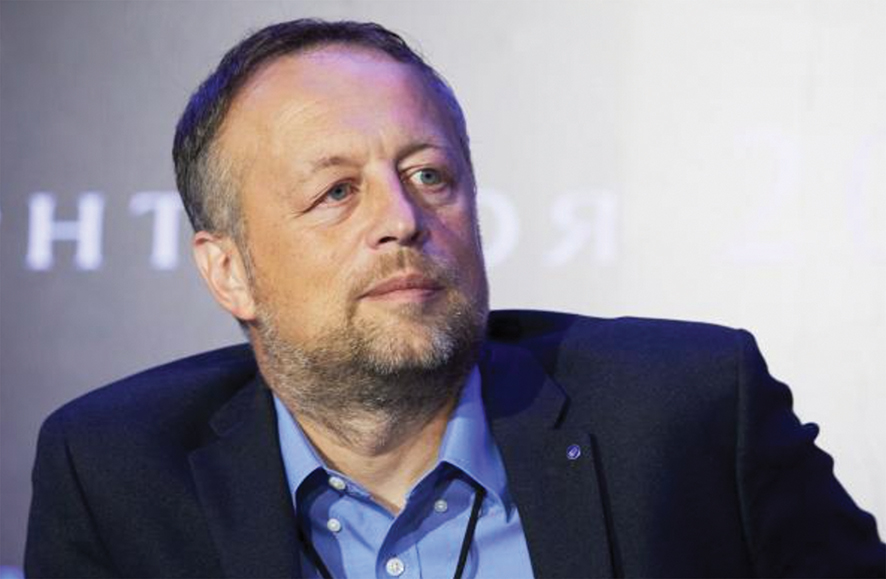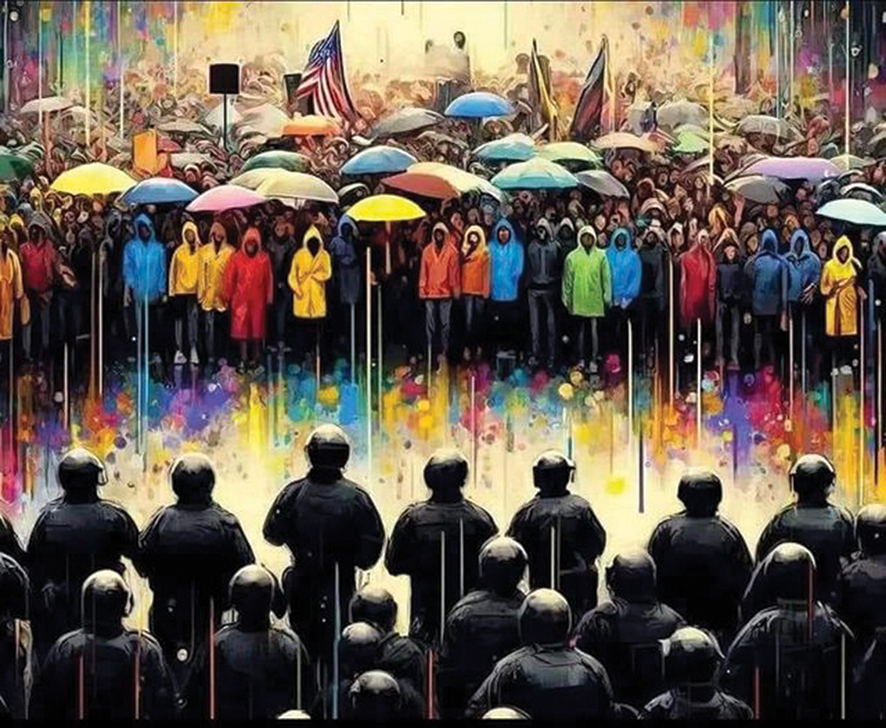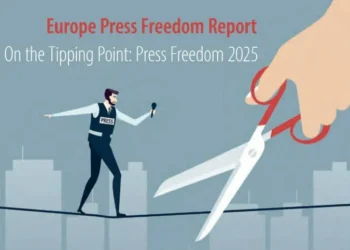Self-exiled Kremlin critic, economist Konstantin Sonin was a senior official at the Moscow-based Higher School of Economics and New Economic School. Since 2015, Sonin has been a professor at the University of Chicago. As he has lived through the Russian version of the new law Georgia’s ruling party are set on introducing, RFE/RL’s Georgian Service sat down with him to pick through the details.
Over these last 30 years, Georgian civil society has built up very strong resistance to encroachments on civil society rights
“This is by no means a purely Georgian phenomenon, or Russian, for that matter. All undemocratic governments are prone to try and blame outside forces, foreigners, for their own shortcomings,” he tells us. “‘The government is great, it’s the foreigners that are to blame, the foreign influence is trying to undo all our good work.’ The government blames the opposition, saying ‘they oppose us not because we aren’t performing well, or even because they disagree with us, no – they oppose us because they are being paid by ‘others,’ by foreigners, Americans, aliens, extraterrestrials,’ you name it. This was the favorite tactic of Zimbabwean dictator Robert Mugabe: He blamed America for everything. Nobody knew or cared much about Zimbabwe or Mugabe in Washington, but he was blaming them for everything nonetheless. Georgian Dream, in a sense, are typical of people in power. Even in democratic countries, politicians will sometimes bring up foreign influence as an excuse. It is very deep rooted.
“Georgian Dream is pushing for this law because that’s best the way to entrench themselves in power, and to claim that the opposition is against them not because they are corrupt and performing badly, but because there’s some foreign influence that is impeding their ‘glorious’ path towards progress. Putin in Russia has been extremely successful with this tactic, to the extent that, right now, in Russia, they call some of the most important contemporary writers Russia has – Dimitry Glukhovsky and Boris Akunin, ‘agents.’ Obviously, there is no basis for it, they aren’t agents; Putin just wants to silence his critics. Georgian Dream seems to be trying to do the same.”

What would the next logical step be in this, if the russian experience is anything to go by?
Unlike Russia, I think that Georgia actually has a lot more democratic institutions and very strong democratic traditions.
They will try to use this law to harass opposition, civil society, media. I’m pretty sure they do not care about foreign influence at all. They will obviously use this law as leverage in the upcoming elections. If they are able to curtail opposition activity, they will probably win not only the majority, but even the constitutional majority, and will try to change the constitution to further entrench themselves. If we go by the Hungarian example, as Orban also seems to be a big influence here, then next will come the media and media ownership, basically, silencing all kinds of independent media. This would be a natural next step.
Right now we seem to be at an impasse – people are not willing to budge and the government is not willing to back down. What next, again, if we take the Russian experience into account?
Over these last 30 years, Georgian civil society has built up very strong resistance when it comes to encroaching on civil society rights. One way it could escalate is that the government does something stupid, for example, as Yanukovich did in Ukraine in 2014, when he decided that if he just shoots people, they will disperse and he will claim victory. The second he did that, he immediately lost all support, including of police and the special services. So in this stalemate, I think the government is playing with fire. If they dare to go and shoot at people, I imagine even those who are on the fence, trying to remain neutral, will speak out against them.
Unlike Russia, Georgia has a lot more democratic institutions and very strong democratic traditions
If people vote them out in October, will they relinquish the reins, with so much now to lose?
It is a common fear in young democracies, isn’t it? But, in many countries, the governments come to stay in power, and then they lose and have to vacate the seat. In Brazil, there were a lot of expectations about President Bolsonaro, that he would stay even if he lost. He lost, by a very thin margin. And I am pretty sure he would have liked nothing better than to stay, but the army and the police said: “You’ve lost, this is a democracy, you have to go.”
That’s one scenario. But civil society and protesters fear this could turn into a Belarus model for Georgia, even if Georgian Dream lose at the elections. How big is the danger of that?
I think there is such a risk. Tsikhanouskaya won the elections, but was denied. The protests were huge. But Georgia isn’t Belarus – in Georgia, if there were protests of that size, that would easily topple whoever is in government.

Lukashenko relied on Russian guns and tanks to remain in power. And the fear is we could see a repeat of that in Georgia.
I can imagine that Ivanishvili could take money or advice from Russia, but can you imagine Russian people coming to state TV channels or to Georgian police forces and giving them orders and directives, as it was in Belarus?
I think Georgian people would be far less tolerant to such things than people in Belarus were. Belarus never had experience of democracy. So their security, police and so on are far more cohesive with their Russian counterparts. In Georgia, it’s a different picture. Why would Georgian security services, police, or the army want to be run by Russians? I don’t think they would tolerate that, even if the government were to give such an order.
What did Putin have to show for his two-plus year war campaign on his inauguration and May 9th parade?
In his inauguration speech, Putin mentioned the war, or, as he calls it, “special military operation,” and proceeded to say that it was Russia that got attacked by Ukraine in February 2022, and not vice versa, as absurd as that may seem. I think that he understands, somewhere in the back of his mind, maybe subconsciously, that there’s no chance for him to survive in power if Russia recognizes that the war is lost, which means that he has only one other option: To push forward. He desperately needs an exit strategy, but doesn’t dare to voice it aloud, to say that we do need to get out of this war somehow. And every day he pushes forward with the war, it worsens his strategic situation.
And the recent Kremlin reshuffle? Most notably, long-serving defense minister Shoigu being replaced by a technocrat with no military experience to speak of, Andrei Belousov.
I think that Putin is unhappy with how the war is going and wanted to replace Shoigu. Still, Putin is so paranoid about losing power that he considers only 100% loyal those uncharismatic people with no political base of their own in any position of authority. Belousov was selected for his loyalty and lack of charisma.
Why would the Georgian security services or police want to be run by Russians? They wouldn’t tolerate it, even if the government were to give such an order
What about Putin’s domestic standing? He has taken all rivals off the board- survived Prigozhin, got rid of Navalny. Can he stop looking over his shoulder?
At the moment, he does have the loyalty of his police, secret services and the army. But if tomorrow there is an announcement that says the Security Council had gathered and decided to put comrade Putin into a retirement home, will people rush to the streets and demand that Putin is brought back? Absolutely not. So his hold on power seems strong until it suddenly isn’t anymore.
With that in mind, do you see him serving his tenure to the end, all these long 6 years?
He will stay in power until his death or until he is dismissed and put under house arrest. I am not a medical professor privy to his health situation, and I dearly hope that there are still some patriotic people around him who would remove him from power, but if I had to bet, I would say he will die on the throne. And once he is no longer there, we’ll see an immediate relief. It’s not that everything will change overnight for the better, but it will be a chance for positive development, to make steps in the right direction.
Interview by Vazha Tavberidze














